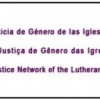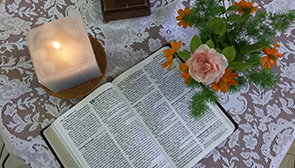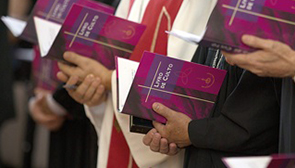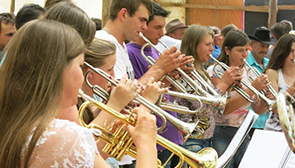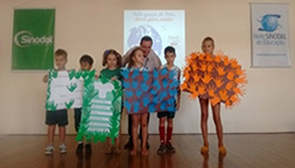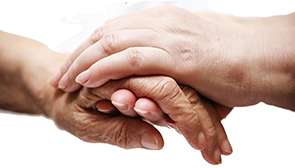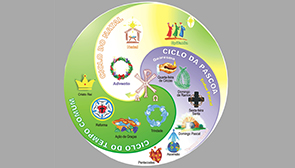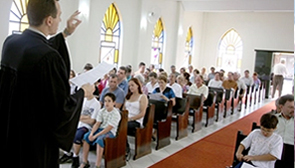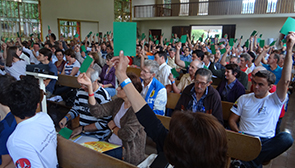Bible Study 4
Pastora Mariela Alejandra Pereyra
Iglesia Evangélica Luterana Unida
Traducción: Elisa Pérez Trejo. Iglesia Luterana Mexicana.
Luke 10:38-40.
Martha and Mary invite us to their house!
Let's read this beautiful text together, in the Gospel of Luke we have many stories of women and daily scenes of discipleship. There are many other texts with challenging and transformative dialogues of Jesus with women.
Clues for the Gospel…
In the time of Jesus the woman's place was totally regulated, inside her house and at the service of the man (father, brother, husband). The Gospel of Luke extensively recounts the image of the Jewish woman dominated by the house, the state and the temple, although at the same time it brings to the scene a woman prophet, the impure, the foreigner. In the New Testament world, nothing is so linear, nor simple to interpret.
At that time it was considered a blessing not to have been born a woman and they did not have access to education, they could not even speak in public. Jesus breaks the stereotypes of the time, dialogues, calls and discusses with women, on many occasions he has a change of attitude or vision on the issue raised.
As we can imagine, and as the texts attest, the apostles were overcome in the face of the social and religious changes of the preaching of their teacher, so many times they tried to put it within the norm established by their times. Jesus, however, kept calling and preaching towards another possible reality, that of the Kingdom of God, where justice lives for all people without distinction.
In the reality of Covid-19 we have seen the injustice in the treatment and place of women, in the face of the crisis the setback in life “inside the house” is evident, even when men and women remained, the roles and functions continued to be unfair and oppressive.
I invite you to share some questions, with yourself and / or with your peers:
How are we today behind closed doors, is there an equitable and dignified distribution of tasks for the people who live in the house?
Do we have time to sit down and rest, listen, think and pray?
Do we see an increase in verbal and / or physical abuse?
How are we relating to the people with whom we live?
From the doors to the inside ...
Returning to the text we see that Jesus is received in the house of these two women, it is so significant that they have names: Martha and Mary.
As is custom and command Jesus is received and attended as expected. However if we look at the scene more closely we can clearly see the place of one of the sisters, Mary a disciple of Jesus at his feet and he teaching. Actually, the two of them are probably listening, but one has the possibility of being exclusively a disciple at that moment. Why doesn't Marta leave everything and sit down too? She does what she wants or rather does what she can, she sees an injustice in Maria's action that does not help her.
For most women, the distribution of tasks has tripled and quadrupled in this reality of Coronavirus, homes have become a place of constant demand and there is no longer time alone, we are always at the service of ... work, family, homework, “virtual meetings”, household chores, shopping, etc., etc.
Today it is also necessary to denounce again that every person who has their life diminished by stereotypical roles lives an unjust and violent situation. How to build homes of peace based on inequality and lack of opportunities? Injustices that continue to maintain sexism, classism, and racism have no place in Christian dialogue and discipleship. A theologian named Dorothe Sölle said that the tears of women are the strongest manifestation of powerlessness in the face of the legality of injustice. How much anger, impotence and pain saved by generations need to be healed?
The importance of new habits
Civil society has rapidly incorporated new hygiene, transportation and public health habits. We understand by habit any learned behavior (that is, we are not born with any habit) by repeating automatically and without thinking about it.
With media and government campaigns we incorporate hand washing and the use of face masks, for example. Well, if we can incorporate those habits, we can also very well unlearn those other automatic attitudes that have been taught to us.
Nobody is born macho, nobody is born violent, nobody is born racist. It is in our homes, societies and even churches that we transform habits into culture or immovable opinions.
Now is an excellent time to be disciples, to sit and listen and transform the habit and internal dynamics of the homes we inhabit. It is urgent to re-resignify the dynamics of our realities, our houses and the way in which we relate are today the focus of attention.
Dear sisters, dear brothers, starting from the smallest and most daily are the paths to other realities, another world where justice and peace can inhabit. We have learned and we can also see how habits are reeducated, transformed and even some disappear with a lot of commitment, change of vision and the help of God.
Today we ask the Divine Wisdom to guide, protect and bless us to find ways of justice and well-being. In the Gospel of Luke 10:42 we read: Mary has chosen the best part!
Let us work together and united so that people can choose, choose paths without violence and pressure from others. We will be companions and companions in discipleship and full life, that is possible in the encounter with Jesus and in constant and transforming dialogue.


